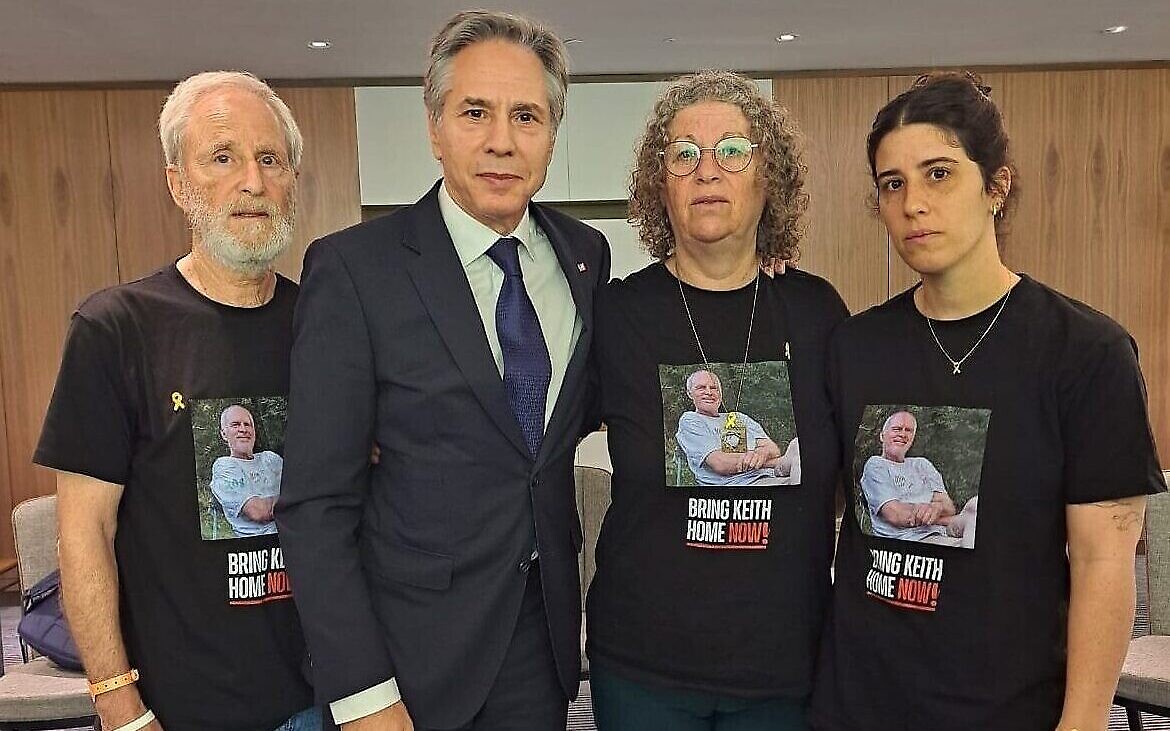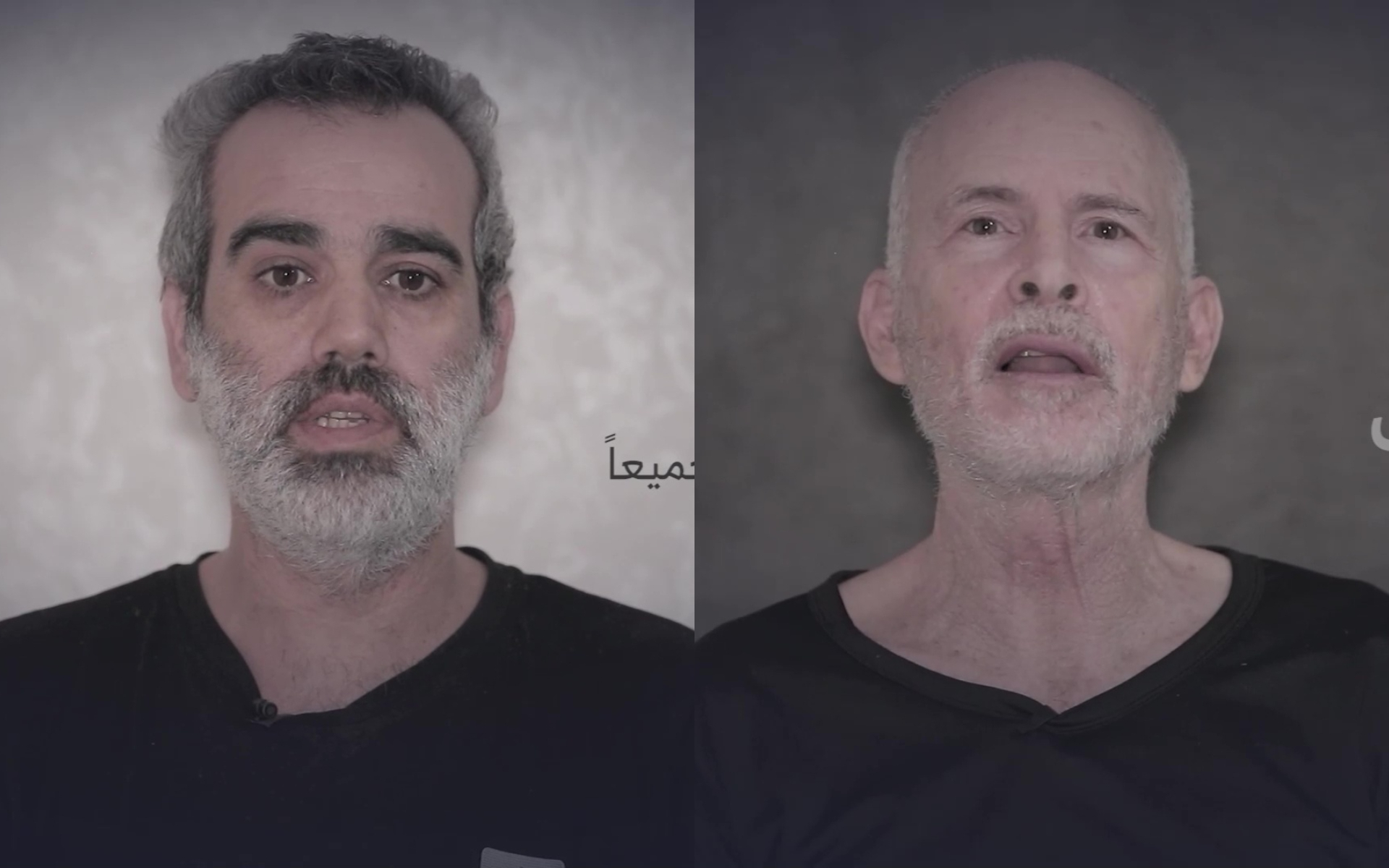



On Wednesday morning, Lee Siegel and several of his relatives sat down with US Secretary of State Antony Blinken to discuss the plight of Lee’s younger brother, Keith Siegel, an Israeli-American who has been in Hamas captivity for over 200 days.
Lee Siegel thinks the meeting, at Tel Aviv’s Kempinski Hotel, was his third with Blinken. And like every time he’s met in the last seven months with a member of the US government — Democrat or Republican — it reinforced to him just how supportive American leaders have been of the Israeli hostage families.
“It’s an absurd situation that an Israeli citizen has the ear of the US to engage in the matter of the hostages, but not our government,” American-born Siegel told The Times of Israel, referring to the relatively few meetings members of the Israeli government have had with hostage families.
Dual US citizen families met with Blinken and US Ambassador Jack Lew on Wednesday morning, including Keith Siegel’s wife Aviva Siegel — herself a released hostage — and two of Aviva and Keith’s children. Also in attendance were the parents of hostage Hersh Goldberg-Polin, and the family of Judith Weinstein Haggai and Gadi Haggai, who were killed on October 7 with their bodies abducted by the Hamas terror group.
Siegel said that Blinken didn’t divulge any new details about the latest potential truce deal, which would reportedly bring about an extended pause in the fighting and the release of at least 33 hostages.
“The answer should be coming very, very soon,” said Siegel in an interview with The Times of Israel on Wednesday afternoon. “I’m working hard to keep expectations down.”
At the very start of the talks following the devastating Hamas onslaught of October 7, when Aviva and Keith Siegel were taken hostage to Gaza from their home in Kibbutz Kfar Aza, their four adult children took the lead, with their aunts and uncles available for support, advice and help.
Until then, the Siegels and their four children had been “the least political people that you would ever meet,” Lee Siegel said. Unlike them, Lee had been a regular attendee at last year’s regular demonstrations against the government’s judicial overhaul plans.
“It just wasn’t who they were,” said Siegel, who has lived for nearly 50 years in Kibbutz Gezer in the country’s center, a community founded by many liberal American Jews. “They’re wonderful, beautiful, smart people, but they weren’t about politics.”
When Aviva Siegel was released on November 26 after 51 days of captivity, she quickly joined the battle to get her husband and the rest of the hostages home.
“My sister-in-law, very, very quickly, as in two weeks, got on an airplane and went to the US with a delegation without really being certain who she would meet,” said Siegel. “Whatever it would take to get Keith home.”
Aviva Siegel is not fully back to her former self, said her brother-in-law. She has also made it clear that she and Keith — when he returns — will not return to live in Kibbutz Kfar Aza.
“When I tell her she has to take care of herself, she says she’ll have time when Keith gets home,” said Siegel. “You can sometimes feel that she’s somewhere else.”
The family has always been close, said Siegel, especially after Keith followed in his footsteps and immigrated to Israel. Both brothers married women with South African backgrounds.
Keith and Aviva Siegel wanted to forge their own path in Israel and moved to Kfar Aza to be part of a new, young community.
About 15 years ago, the situation in Gaza-adjacent communities began to worsen, “with so many [rocket] alerts and acts of terror that most of Israel isn’t aware of,” said Siegel, referring to the frequent rocket attacks by Gazan terror groups and occasional flareups. “There was a feeling of insecurity, of having a war every couple of years, with helicopters and jets and sirens, even if some of them were false alarms.”
Keith and Aviva’s children served in army units in the Gaza border communities, and three of the four later left the south to live in other parts of the country, said their uncle.
On October 7, Aviva and Keith and their son, Shai, were in their homes in Kfar Aza, where 62 people were killed and 19 were taken hostage by Hamas terrorists.
When Aviva and Keith were taken hostage, they didn’t know if Shai had survived, which he had.
“Aviva didn’t know for 51 days and Keith still may not know,” said Siegel.
On April 27, five months after Aviva Siegel was released, Hamas published a propaganda video showing signs of life from Siegel, 64, and fellow hostage Omri Miran, 46. For their families, that showed there was no time to waste in making a deal with Hamas.
While Lee Siegel was steadily involved in last year’s anti-government rallies, now he only attends demonstrations solely dedicated to getting the hostages home.
“People ask me if we can have Keith’s picture at the other demonstrations, protesting the government, and I say ‘yes,'” said Lee. “If I find myself in a place like that, I don’t turn around and go away, but I don’t personally seek that out.”
When he’s at the Knesset or confronted with people who believe that pressing on with the war in Gaza is the only way, he doesn’t argue, said Siegel.
“I just say what I have to say,” he said.
Siegel recently spoke with Settlements and National Projects Minister Orit Strock, who sparked criticism from political rivals Wednesday when she called the current hostage deal “terrible.”
At the time, he told her he expected her support to bring the hostages home and she told him she prays twice a day for the hostages at the Tomb of the Patriarchs in Hebron, where she lives.
Siegel made it clear to her that this wasn’t the kind of support he meant.
“I waffle about how much to talk down about [Prime Minister Benjamin] Netanyahu. I go back and forth between ‘he’s the prime minister of this country, he signed up for this job, his job is to bring my brother home alive,’ but I’m not out there with a megaphone or burning tires,” said Siegel.
“I just want my brother home.”





